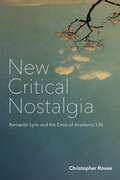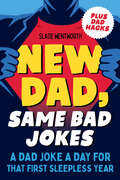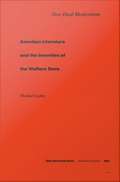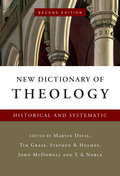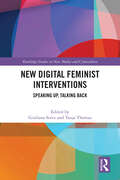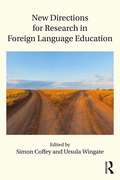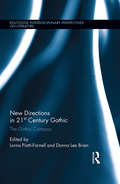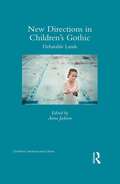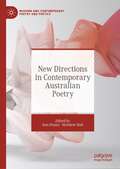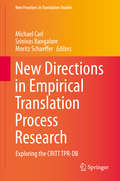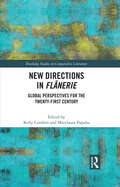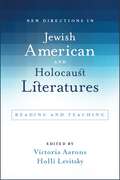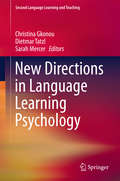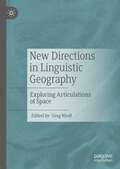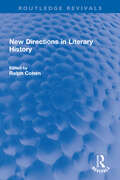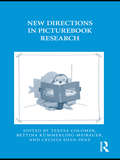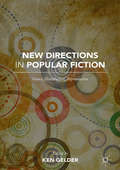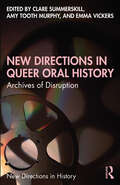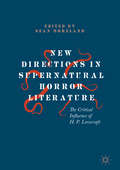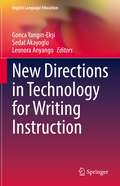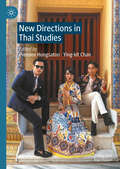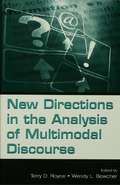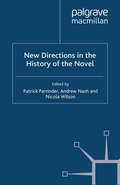- Table View
- List View
New Critical Nostalgia: Romantic Lyric and the Crisis of Academic Life (Lit Z)
by Christopher RoveeNew Critical Nostalgia weighs the future of literary study by reassessing its past. It tracks today's impassioned debates about method back to the discipline’s early professional era, when an unprecedented makeover of American higher education with far-reaching social consequences resulted in what we might call our first crisis of academic life. Rovee probes literary study’s nostalgic attachments to this past, by recasting an essential episode in the historiography of English—the vigorous rejection of romanticism by American New Critics—in the new light of the American university’s tectonic growth. In the process, he demonstrates literary study’s profound investment in romanticism and reveals the romantic lyric’s special affect, nostalgia, as having been part of English’s professional identity all along. New Critical Nostalgia meticulously shows what is lost in reducing mid-century American criticism and the intense, quirky, and unpredictable writings of central figures, such as Cleanth Brooks, Josephine Miles, and W. K. Wimsatt, to a glib monolith of New Critical anti-romanticism. In Rovee’s historically rich account, grounded in analysis of critical texts and enlivened by archival study, readers discover John Crowe Ransom’s and William Wordsworth’s shared existential nostalgia, witness the demolition of the “immature” Percy Shelley in the revolutionary textbook Understanding Poetry, explore the classroom give-and-take prompted by the close reading of John Keats, consider the strange ambivalence toward Lord Byron on the part of formalist critics and romantic scholars alike, and encounter the strikingly contemporary quantitative studies by one of the mid-century’s preeminent poetry scholars, Josephine Miles. These complex and enthralling engagements with the romantic lyric introduce the reader to a dynamic intellectual milieu, in which professionals with varying methodological commitments (from New Critics to computationalists), working in radically different academic locales (from Nashville and New Haven to Baton Rouge and Berkeley), wrangled over what it means to read, with nothing less than the future of the discipline at stake.
New Dad, Same Bad Jokes: A Dad Joke a Day for That First Sleepless Year
by Slade WentworthQ: Why is that baby still in diapers?A: I&’ll give you two reasons: number one and number two.Calling new dads! Cackle and eye-roll your way through baby&’s first year with 365 hilariously horrible dad jokes for parents who have no idea what they&’re in for. Classically corny plus new cringe, these jokes help first-time dads take a load off, tickle their loved ones, and give baby their first giggly groan. New Dad, Same Bad Jokes won&’t make it easier to be a new parent, but it will soften the blow with some hearty LOLs, new-dad tips, and prompts to document the messy, endearing, and hilarious moments of first-time fatherhood. While baby might still be little, this dad joke book is full-groan!Inside, Dad will find: A joke a day for baby&’s first year! Baby jokes and a whole lot more. 365 classic puns, one-liners, and Q&As to give you a zing when that coffee won&’t quite cut it.Hilariously useful Dad Hacks. Stop pee mid-air? Wrap baby like a burrito? Help mom eat one-handed? Tips you didn&’t know you needed to survive year one.Space to record early memories of baby. Prompts to jot down the sweet, the silly, the stinky as baby grows from swaddled to swindler.
New Deal Modernism: American Literature and the Invention of Welfare State
by Michael SzalayIn New Deal Modernism Michael Szalay examines the effect that the rise of the welfare state had on American modernism during the 1930s and 1940s, and, conversely, what difference this revised modernism made to the New Deal's famed invention of "Big Government. " Szalay situates his study within a liberal culture bent on security, a culture galvanized by its imagined need for private and public insurance. Taking up prominent exponents of social and economic security--such as Franklin Delano Roosevelt, John Maynard Keynes, and John Dewey--Szalay demonstrates how the New Deal's revision of free-market culture required rethinking the political function of aesthetics. Focusing in particular on the modernist fascination with the relation between form and audience, Szalay offers innovative accounts of Busby Berkeley, Jack London, James M. Cain, Robert Frost, Ayn Rand, Betty Smith, and Gertrude Stein, as well as extended analyses of the works of Ernest Hemingway, John Steinbeck, and Richard Wright.
New Deal Modernism: American Literature and the Invention of the Welfare State
by Michael SzalayA unique leterary criticism.
New Dictionary of Theology: Historical and Systematic
by Kevin J. Vanhoozer David Emmanuel Singh Roland ChiaThis classic one-volume reference work has been appreciated for decades. It is now substantially expanded and revised to focus on a variety of theological themes, thinkers and movements. From African Christian Theology to Zionism, this volume of historical and systematic theology offers a wealth of information and insight for students, pastors and all thoughtful Christians. Over half of the more than eight hundred articles are new or rewritten with hundreds more thoroughly revised. Fully one-third larger than its predecessor, this volume focusing on systematic and historical theology has added entries and material on theological writers and themes in North America and around the world. Helpful bibliographies have also been updated throughout. Over three hundred contributors form an international team of renowned scholars including Marcella Altaus-Reid, Richard Bauckham, David Bebbington, Kwame Bediako, Todd Billings, Oliver Crisp, Samuel Escobar, John Goldingay, Tremper Longman III, John McGuckin, Jennifer McNutt, Michael J. Nasir-Ali, Bradley Nassif, Mark Noll, Anthony Thiselton, John Webster and N. T. Wright. This new edition combines excellence in scholarship with a high standard of clarity and profound insight into current theological issues. Yet it avoids being unduly technical. Now an even more indispensable reference, this volume is a valuable primer and introduction to the grand spectrum of theology.
New Digital Feminist Interventions: Speaking Up, Talking Back (Routledge Studies in New Media and Cyberculture)
by Tanja Thomas Giuliana SorceThis volume proposes “speaking up” and “talking back” as new theoretical access points for studying feminist activism in digital spaces.Drawing on the influential work of bell hooks, it highlights social justice interventions by feminist/queer/decolonial actors, groups, and collectives who recover the digital as a space for activist organizing and campaigning. In presenting a variety of sociocultural issues, such as gender violence, queer discrimination, or migrant hostility, the book centers empowerment practices in their digital forms, showcasing interventions in Asia, Europe, and the Americas—thereby critically examining the conditions for marginalized voices to speak up, talk back, and be heard in digital publics. In focusing on activist practices, formats, experiences, and scholarship, the contributions analyze many facets of digital feminist contention, including resistance storytelling, hashtag activism, grassroots journalism, or diaspora podcasting.This international and interdisciplinary volume will interest students and scholars of Media and Communication, Social Movements and Activism, Cultural Studies, Gender and Queer Studies, and Race and Ethnicity.
New Directions for Research in Foreign Language Education
by Ursula Wingate Simon CoffeyNew Directions for Research in Foreign Language Education brings together contributions by reputed scholars that examine the challenges, opportunities, and benefits of teaching and learning foreign languages. With a particular focus on languages other than English, the book looks at the socio-political dimension of language learning and teaching and the need to re-theorize multilingualism for our age. The volume includes a range of perspectives, from language teaching as an act of reconciliation to language learning across the lifespan, from innovations in assessment and curriculum to critical appraisals of pedagogy and textbook materials. Each chapter presents a clear case study drawn from diverse contexts to illustrate the different concerns of the contributors. The book is a valuable resource for all students, teachers, teacher educators and researchers who share an interest in researching multilingualism and the different facets of teaching and learning foreign languages.
New Directions in 21st-Century Gothic: The Gothic Compass (Routledge Interdisciplinary Perspectives on Literature)
by Lorna Piatti-Farnell Donna Lee BrienThis book brings together a carefully selected range of contemporary disciplinary approaches to new areas of Gothic inquiry. Moving beyond the representational and historically based aspects of literature and film that have dominated Gothic studies, this volume both acknowledges the contemporary diversification of Gothic scholarship and maps its changing and mutating incarnations. Drawing strength from their fascinating diversity, and points of correlation, the varied perspectives and subject areas cohere around a number of core themes — of re-evaluation, discovery, and convergence — to reveal emerging trends and new directions in Gothic scholarship. Visiting fascinating areas including the Gothic and digital realities, uncanny food experiences, representations of death and the public media, Gothic creatures and their popular legacies, new approaches to contemporary Gothic literature, and re-evaluations of the Gothic mode through regional narratives, essays reveal many patterns and intersecting approaches, forcefully testifying to the multifaceted, although lucidly coherent, nature of Gothic studies in the 21st Century. The multiple disciplines represented — from digital inquiry to food studies, from fine art to dramaturgy — engage with the Gothic in order to offer new definitions and methodological approaches to Gothic scholarship. The interdisciplinary, transnational focus of this volume provides exciting new insights into, and expanded and revitalised definitions of, the Gothic and its related fields.
New Directions in Children's Gothic: Debatable Lands (Children's Literature and Culture)
by Anna JacksonChildren’s literature today is dominated by the gothic mode, and it is in children’s gothic fictions that we find the implications of cultural change most radically questioned and explored. This collection of essays looks at what is happening in the children’s Gothic now when traditional monsters have become the heroes, when new monsters have come into play, when globalisation brings Harry Potter into China and yaoguai into the children’s Gothic, and when childhood itself and children’s literature as a genre can no longer be thought of as an uncontested space apart from the debates and power struggles of an adult domain. We look in detail at series such as The Mortal Instruments, Twilight, Chaos Walking, The Power of Five, Skulduggery Pleasant, and Cirque du Freak; at novels about witches and novels about changelings; at the Gothic in China, Japan and Oceania; and at authors including Celia Rees, Frances Hardinge, Alan Garner and Laini Taylor amongst many others. At a time when the energies and anxieties of children’s novels can barely be contained anymore within the genre of children’s literature, spilling over into YA and adult literature, we need to pay attention. Weird things are happening and they matter.
New Directions in Contemporary Australian Poetry (Modern and Contemporary Poetry and Poetics)
by Matthew Hall Dan DisneyThis book sets out to navigate questions of the future of Australian poetry. Deliberately designed as a dialogue between poets, each of the four clusters presented here—“Indigeneities”; “Political Landscapes”; “Space, Place, Materiality”; “Revising an Australian Mythos”—models how poetic communities in Australia continue to grow in alliance toward certain constellated ideas. Exploring the ethics of creative production in a place that continues to position capital over culture, property over community, each of the twenty essays in this anthology takes the subject of Australian poetry definitively beyond Eurocentrism and white privilege. By pushing back against nationalizing mythologies that have, over the last 200 years since colonization, not only narrativized the logic of instrumentalization but rendered our lands precarious, this book asserts new possibilities of creative responsiveness within the Australian sensorium.
New Directions in Empirical Translation Process Research
by Srinivas Bangalore Michael Carl Moritz SchaefferThis volume provides a comprehensive introduction to the Translation Process Research Database (TPR-DB), which was compiled by the Centre for Research and Innovation in Translation and Technologies (CRITT). The TPR-DB is a unique resource featuring more than 500 hours of recorded translation process data, augmented with over 200 different rich annotations. Twelve chapters describe the diverse research directions this data can support, including the computational, statistical and psycholinguistic modeling of human translation processes. In the first chapters of this book, the reader is introduced to the CRITT TPR-DB. This is followed by two main parts, the first of which focuses on usability issues and details of implementing interactive machine translation. It also discusses the use of external resources and translator-information interaction. The second part addresses the cognitive and statistical modeling of human translation processes, including co-activation at the lexical, syntactic and discourse levels, translation literality, and various annotation schemata for the data.
New Directions in Flânerie: Global Perspectives for the Twenty-First Century (Routledge Studies in Comparative Literature)
by Kelly ComfortThis book distinguishes itself from previous scholarship by offering an inclusive and comprehensive treatment of urban walking from 1800 to the present. Divided into three sections—geography, genius, and gender—the introduction establishes the origins of the flâneur and flâneuse in early foundational texts and explores later works that reimagine flânerie in terms of these same three themes. The volume’s contributors provide new and global perspectives on urban walking practices through their treatment of a variety of genres (literature, film, journalism, autobiography, epistolary correspondence, photography, fashion, music, digital media) and regions (Europe, Asia, the Americas, Africa, the Middle East). This volume theorizes well-known urban characters like the idler, lounger, dandy, badaud, promeneuse, shopper, collector, and detective and also proposes new iterations of the flâneur/flâneuse as fashion model, gaucho, cruiser, musician, vampire, postcolonial activist, video game avatar and gamer.
New Directions in Jewish American and Holocaust Literatures: Reading and Teaching (SUNY series in Contemporary Jewish Literature and Culture)
by Victoria Aarons; Holli LevitskyWhat does it mean to read, and to teach, Jewish American and Holocaust literatures in the early decades of the twenty-first century? New directions and new forms of expression have emerged, both in the invention of narratives and in the methodologies and discursive approaches taken toward these texts. The premise of this book is that despite moving farther away in time, the Holocaust continues to shape and inform contemporary Jewish American writing. Divided into analytical and pedagogical sections, the chapters present a range of possibilities for thinking about these literatures. Contributors address such genres as biography, the graphic novel, alternate history, midrash, poetry, and third-generation and hidden-child Holocaust narratives. Both canonical and contemporary authors are covered, including Michael Chabon, Nathan Englander, Anne Frank, Dara Horn, Joe Kupert, Philip Roth, and William Styron.
New Directions in Language Learning Psychology
by Sarah Mercer Christina Gkonou Dietmar TatzlThis book explores potential new directions in the growing field of language learning psychology. The individual chapters cover theoretical and conceptual developments and innovative methodological designs, while also exploring practical implications. Language learning psychology is a vibrant field of research that typically involves constructs from social and educational psychology, which it considers in terms of their relevance for the domain of language learning. The diverse theoretical and empirical chapters examine a range of familiar and lesser-known constructs, highlighting the importance of taking into account both learner and teacher psychologies, and recognising the complexity, dynamism and situatedness of psychological constructs, as well as the value of employing diverse research methodologies. It is hoped that these 'new directions' concerning populations, constructs and theoretical and methodological frameworks will pave the way for innovative future developments in this vibrant field.
New Directions in Linguistic Geography: Exploring Articulations of Space
by Greg NiedtThis collection brings together contributions from a new wave of research into language, space, and place, at the intersection of various disciplines, from geography to sociolinguistics and linguistic anthropology. The authors investigate the myriad ways that people conceive of—and thereby describe—the world around them, studying the impact these ideas have on their identities, and highlighting the tension between conflicting ontologies of space.It is a timely and invaluable new resource for researchers and students in linguistics, geography, anthropology and communication.
New Directions in Literary History (Routledge Revivals)
by Ralph CohenFirst published in 1974, New Directions in Literary History is a comprehensive attempt to present approaches to literary studies that have developed from phenomenology, stylistics and linguistics, Marxist reconsiderations of literature, interdisciplinary studies and analysis of reader response. Written by an international group of scholars, the essays are taken from the pages of New Literary History. They range from the Middle Ages to contemporary literature. European and American literary critics are here represented, together with an art critic, a philosopher and a novelist. Their essays deal with crucial problems in the study of literature: the relationship of the contemporary critic to works of the past; the place of method in literary study; how reading takes place; the role of the reader in different literary periods in providing a guide to interpretation; the language of literature and its relation to natural or ordinary language; the origin and decline of literary forms; and what constitutes literature, especially in the relation between fictional character and autobiography. Although the essays are essentially concerned with theoretical issues, they also examine the practical applications to literature. Students of English literature and literary theory will find this book particularly interesting.
New Directions in Picturebook Research (Children's Literature And Culture Ser. #70)
by Teresa ColomerIn this new collection, children’s literature scholars from twelve different countries contribute to the ongoing debate on the importance of picturebook research, focusing on aesthetic and cognitive aspects of picture books. Contributors take interdisciplinary approaches that integrate different disciplines such as literary studies, art history, linguistics, narratology, cognitive psychology, sociology, memory studies, and picture theory. Topics discussed include intervisuality, twist endings, autobiographical narration, and metaliterary awareness in picturebooks. The essays also examine the narrative challenges of first-person narratives, ellipsis, and frame-breaking in order to consider the importance of mindscape as a new paradigm in picturebook research. Tying picturebook studies to studies in childhood, multimodality, and literacy, this anthology is a representative of the different opportunities for research in this emerging field.
New Directions in Popular Fiction
by Ken GelderThis book brings together new contributions in Popular Fiction Studies, giving us a vivid sense of new directions in analysis and focus. It looks into the histories of popular genres such as the amatory novel, imperial romance, the western, Australian detective fiction, Whitechapel Gothic novels, the British spy thriller, Japanese mysteries, the 'new weird', fantasy, girl hero action novels and Québecois science fiction. It also examines the production, reproduction and distribution of popular fiction as it carves out space for itself in transnational marketplaces and across different media entertainment systems; and it discusses the careers of popular authors and the various investments in popular fiction by readers and fans. This book will be indispensable for anyone with a serious interest in this prolific but highly distinctive literary field.
New Directions in Queer Oral History: Archives of Disruption (New Directions in History)
by Emma Vickers Clare Summerskill Amy Tooth MurphyThis comprehensive international collection reflects on the practice, purpose, and functionality of queer oral history, and in doing so demonstrates the vibrancy and innovation of this rapidly evolving field. Drawing on the roots of oral history’s original commitment to "history from " queer oral history has become an indispensable methodology at the heart of queer studies. Expanding and extending the existing canon, this book offers up key observations about queer oral history as a methodology, and how it might be advanced through cutting edge approaches. The collection contains a mix of contributions from established scholars, early career researchers, postgraduate students, archivists, and activists, ensuring its accessibility and wide appeal. The go-to reference for queer oral history for scholars, undergraduate and postgraduate students, and community-engaged practitioners, New Directions in Queer Oral History advances rigorous methodological and theoretical debates and constitutes a significant intervention in the world of oral history.
New Directions in Supernatural Horror Literature: The Critical Influence of H. P. Lovecraft
by Sean MorelandThis collection of essays examines the legacy of H.P. Lovecraft’s most important critical work, Supernatural Horror in Literature. Each chapter illuminates a crucial aspect of Lovecraft’s criticism, from its aesthetic, philosophical and literary sources, to its psychobiological underpinnings, to its pervasive influence on the conception and course of horror and weird literature through the twentieth and early twenty-first centuries. These essays investigate the meaning of cosmic horror before and after Lovecraft, explore his critical relevance to contemporary social science, feminist and queer readings of his work, and ultimately reveal Lovecraft’s importance for contemporary speculative philosophy, film and literature.
New Directions in Technology for Writing Instruction (English Language Education #30)
by Gonca Yangın-Ekşi Sedat Akayoglu Leonora AnyangoThis book responds to the changes and needs of English Language Learning by offering insight into online writing pedagogical platforms and atmospheres. Language learning enriched with technology, web tools and applications have become a necessary ingredient in language education internationally. This volume provides an in-depth understanding of writing practices that are responsive to the challenges for teaching and learning writing in local and global contexts of education. It also provides succinct knowledge at the intersection of technology with teaching, learning, and research. The chapters herein creatively take advantage of the affordances of digital platforms and further critiques their limitations. The book also delineates knowledge on concepts, theories, and innovative approaches to digital writing in the field of teaching and learning English. The chapters focus on reviews and provide guidance on the practical use of Web 2.0 and multimedia tools as well as presenting research on technology integration in writing classes.
New Directions in Thai Studies
by Ying-Kit Chan Preedee HongsatonThis book considers recent developments in Thai history and historiography, examining why Thai studies had suffered under a combination of protectionism, uncritical learning, and unwillingness to engage with scholarship from abroad. The essays collected here explore, from Thai perspectives, innovations in theory and methodology in Thai studies, gathering critical insights from disciplines such as anthropology and cultural studies. The book may also serve as an entry to Thai studies, informing experts and non-specialist readers alike on topics such as access to Thai archives, the difficulties in conducting ethnographic research with Thai subjects, the (non-)development of scholarly disciplines in Thailand, and the challenges and opportunities presented by Thai studies as a whole for prospective scholars and graduate students.
New Directions in the Analysis of Multimodal Discourse
by Wendy L. Bowcher Terry D. RoyceNew Directions in the Analysis of Multimodal Discourse offers a comprehensive international view of multimodal discourse and presents new directions for research and application in this growing field. With contributions from top scholars around the world, this work opens up the field of multimodal discourse analysis as it covers a wide range of interests such as computational linguistics, education, ideology, and media discourse. The range and scope of the chapters in this book provide groundbreaking insights into exploring and accounting for the various facets of multimodality in a range of texts and contexts. Initial chapters specifically aim to tackle theoretical issues, while subsequent chapters focus on important research areas such as writing and graphology, genre, ideology, computational concordancing, literacy, and cross cultural and cross linguistic issues. In the final chapters, an emphasis is placed on the educational implications of multimodality in first and second language contexts, a particularly new and interesting contribution.
New Directions in the History of the Novel
by P. Parrinder A. Nash N. WilsonNew Directions in the History of the Novel challenges received views of literary history and sets out new areas for research. A re-examination of the nature of prose fiction in English and its study from the Renaissance to the 21st century, it will become required reading for teachers and students of the novel and its history.
